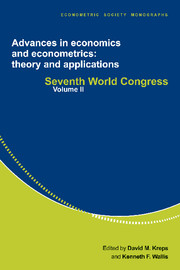Book contents
- Frontmatter
- 1 Incentives and careers in organizations
- 2 Endogenous growth: lessons for and from economic history
- 3 Microtheory and recent developments in the study of economic institutions through economic history
- 4 Poverty traps
- 5 Microenterprise and macropolicy
- 6 Markets in transition
- 7 Transition as a process of large-scale institutional change
- 8 A Schumpeterian perspective on growth and competition
- 9 Learning and growth
- Index
1 - Incentives and careers in organizations
Published online by Cambridge University Press: 05 January 2013
- Frontmatter
- 1 Incentives and careers in organizations
- 2 Endogenous growth: lessons for and from economic history
- 3 Microtheory and recent developments in the study of economic institutions through economic history
- 4 Poverty traps
- 5 Microenterprise and macropolicy
- 6 Markets in transition
- 7 Transition as a process of large-scale institutional change
- 8 A Schumpeterian perspective on growth and competition
- 9 Learning and growth
- Index
Summary
An outsider might be surprised to learn that modern labor economics has little to say about activities inside firms. After all, is not work (i.e., what workers do once they go through a firm's doors) one of the field's most natural areas of inquiry?
Let's take stock. Several research areas in labor economics end precisely when an employment relationship begins: unemployment duration and labor-force participation are examples, and even labor demand typically focuses on how many workers should be hired rather than on what the firm should then do with them. Other research areas in labor economics reduce the employment relationship to a wage, or at most a wage profile: on-the-job search, labor supply, and human-capital models of earnings, for example. Even research on the return to seniority more often focuses on econometric issues than on what actually happens during an employment relationship; similarly, research on training more often focuses on pre-employment government-sponsored programs than on skill development in firms. Simply put, modern labor economics contains little work on work.
The situation may be changing. In this chapter I describe theory and evidence on two aspects of some employment relationships: incentive pay and careers in organizations. Most of the theory I describe is recent, emphasizing games and contracts rather than the workhorse theories of labor economics in the 1970s and 1980s, human capital and search. Much of the evidence is also new, at least in the sense of not having been part of the published discourse in labor economics over the last few decades. This same evidence is also old, however, both in the sense of sometimes referring to events long past (sharecropping in 1910 or a machine shop in Chicago around 1950, for example) and in the sense of sometimes being fairly well-known outside labor economics.
- Type
- Chapter
- Information
- Advances in Economics and Econometrics: Theory and ApplicationsSeventh World Congress, pp. 1 - 37Publisher: Cambridge University PressPrint publication year: 1997
- 48
- Cited by



